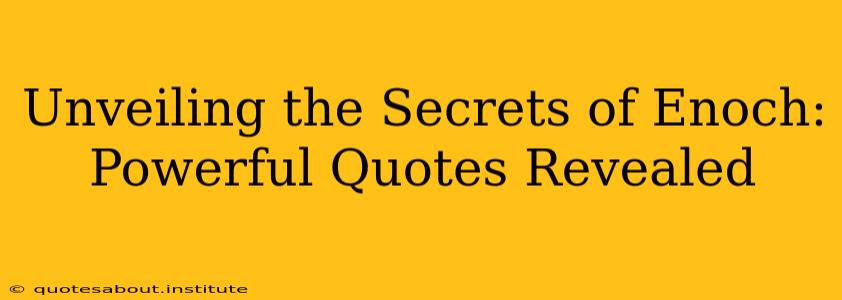The Book of Enoch, a fascinating and often enigmatic text, holds a significant place in Jewish, Christian, and other religious traditions. While not considered canonical scripture in most denominations, its influence on religious thought and mythology is undeniable. This ancient text, attributed to Enoch, a figure mentioned in the Bible, offers profound insights into angels, demons, cosmology, and the ultimate fate of humanity. Exploring its powerful quotes unveils a rich tapestry of spiritual wisdom and apocalyptic vision. This article will delve into some of the most impactful passages from the Book of Enoch, exploring their meaning and significance.
What is the Book of Enoch?
Before diving into the quotes, a brief overview of the Book of Enoch is crucial. This pseudepigraphical work, meaning it's attributed to a historical figure but likely written by someone else, dates back to around the 3rd to 1st centuries BCE. It’s comprised of several distinct sections, each offering unique perspectives on Enoch's visionary experiences. These sections cover diverse topics, from Enoch's ascent to heaven and his encounters with celestial beings to detailed descriptions of angels who rebelled against God and their subsequent punishment. The apocalyptic visions within the text often depict cosmic battles, the judgment of the wicked, and the eventual restoration of righteousness.
Key Themes Explored in the Book of Enoch
Several recurring themes emerge throughout the Book of Enoch, enriching the powerful quotes contained within:
- Angelic Hierarchy: The book meticulously describes a complex hierarchy of angels, both righteous and fallen. Understanding this hierarchy is vital to interpreting many of the quotes.
- Cosmic Judgment: The text foreshadows a great day of judgment, where God will punish the wicked and reward the righteous. This theme underpins many of Enoch’s prophecies.
- Apocalyptic Vision: Vivid descriptions of celestial events, cosmic upheavals, and the ultimate fate of the world dominate much of the text.
- Eschatology: The Book of Enoch extensively explores eschatology, the study of the end times and the last things.
Powerful Quotes from the Book of Enoch and Their Interpretations
Let's delve into some of the most compelling quotes from the Book of Enoch, exploring their significance and the context in which they appear:
"And I saw the winds of heaven which blow over the earth, and the foundations of the earth." (1 Enoch 18:1)
This quote demonstrates Enoch’s direct experience of the celestial realm, witnessing the powerful forces that shape the physical world. It highlights the book’s focus on the interaction between the heavens and the earth.
"And I saw the stars of heaven, how they were innumerable, and how they shone more brightly than all the lights which are upon earth." (1 Enoch 18:3)
This passage emphasizes the vastness and majesty of creation, drawing attention to God's power and the splendor of the universe. The immeasurable number of stars underscores the incomprehensibility of God's power.
"And the sinners will be punished eternally." (1 Enoch 10:16) This is a simplification to represent the theme; the exact phrasing varies in different translations.
This quote emphasizes the severe consequences of sin, a recurrent theme throughout the book. It highlights the concept of eternal judgment, a cornerstone of much religious thought influenced by Enoch.
"And I saw the books opened, and the angels standing by, and the books were delivered to them." (1 Enoch 10:18)
This quote hints at the divine record-keeping of human actions, suggesting an accounting for every deed performed during one's life.
What is the significance of the fallen angels in the Book of Enoch?
The fallen angels, or Watchers, are central figures in the Book of Enoch. Their rebellion against God and their interactions with humanity significantly shaped the world, introducing sin and corruption. Their story serves as a cautionary tale about the consequences of disobedience and the importance of remaining faithful.
How does the Book of Enoch describe the end times?
The Book of Enoch offers detailed descriptions of apocalyptic events, including celestial upheavals, cosmic battles, and the final judgment. These visions detail the destruction of the wicked and the ultimate triumph of God’s righteousness.
Is the Book of Enoch considered canonical scripture?
No, the Book of Enoch is not considered canonical scripture in mainstream Judaism or Christianity. However, it profoundly influenced early Christian thought and is still studied by various religious scholars and theologians for its historical and theological significance.
What are the different sections of the Book of Enoch?
The Book of Enoch is complex, consisting of several distinct sections, including the Book of the Watchers, the Similitudes, the Dream Visions, and the Epistle of Enoch. Each section contributes to the overall narrative and theological message of the text.
Conclusion
The Book of Enoch, with its powerful quotes and apocalyptic visions, continues to resonate with readers today. While not canonical, its impact on religious thought and mythology remains undeniable. Exploring its wisdom offers a unique lens through which to understand themes of judgment, redemption, and the ultimate destiny of humankind. The quotes presented above are only a small sample of the profound insights offered within this ancient text, inviting further exploration and reflection.

